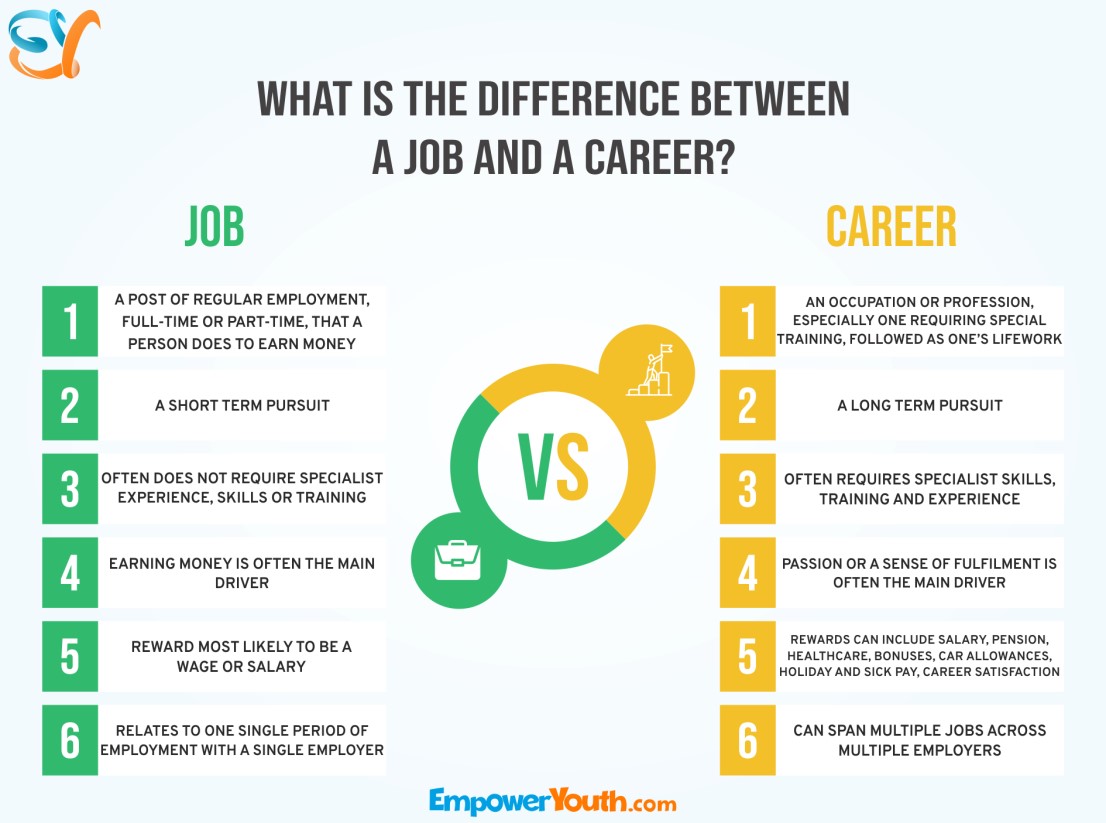
Find Your Passion In Life: Job Vs Career, What's The Path For You?
- Posted On : 28th April 2023
- Written By : Admin
With all the various types of postings in the job portals, some can be a little more career-oriented, while others are just jobs. But wait, what is the difference between the two? A job and a career are two terms that are often used interchangeably, but they actually have distinct meanings. While a job is mostly short-term and paycheck oriented, a career is more about long-term fulfillment. Even though there is no right or wrong between the two, it is essential to understand the basic differences to determine the broad scheme of your professional path.
What Is A Job?
At its core, a job is a temporary or short-term position that an individual holds to earn a paycheck. It may involve performing specific tasks or duties, such as working in retail, food service, or customer service. A job may be full-time, part-time, or seasonal, and it is often entry-level or low-skilled. While a job can provide a source of income and basic job experience, it is not necessarily tied to an individual's long-term career goals.
What Is A Career?
A career, on the other hand, is a more long-term professional path that an individual chooses and develops over time. It involves working in a particular industry or field and pursuing advancement opportunities through education, training, and experience. A career may involve multiple jobs over time, each building on the skills and experience gained in previous roles. Unlike a job, a career is tied to an individual's long-term professional aspirations and goals.
Understanding Job Vs. Career

The significant differences between a job and a career can be broadly classified under:
- Level Of Commitment And Investment
One key difference between a job and a career is the level of commitment and investment required. A job may be temporary or low-commitment, requiring little training or education to start.
A career, on the other hand, typically requires a greater level of investment in terms of education, training, and experience. It often involves long-term planning and goal-setting, as well as ongoing development and growth.
- Satisfaction Levels
Another difference between a job and a career is the level of fulfillment and satisfaction they provide. A job may provide a source of income and basic job experience, but it may not be particularly fulfilling or satisfying in the long run.
A career, on the other hand, offers the opportunity to pursue one's passions and interests, develop specialized skills and expertise, and make a meaningful contribution to society. While a career may involve challenges and setbacks along the way, it can ultimately lead to a greater sense of fulfillment and purpose.
- Personal Values
When considering the difference between a job and a career, it is also important to consider the role of personal values and motivation. A job may be seen as a means to an end, such as paying bills or supporting oneself financially.
A career, on the other hand, is often driven by personal values and motivations, such as a desire to make a positive impact in the world or pursue a particular passion or interest.
Ways To Turn Your Job Into A Career
If you aim to develop a career out of the job that you are doing, here are some strategies that can help:
- Continue learning and development to enhance your knowledge and skills. Determine your strengths, talents, and weaknesses and identify the gaps to develop your qualifications.
- Reach out to individuals in similar careers and get yourself a mentor. Ask for advice and if they will consider supporting you in your journey. Consider your mentor's path to determine if it could work for you.
- Expand your network by attending workshops, seminars, conferences, and social events. A bigger and better network can help you have more resources, experiences, learning, and job recommendations.
- If you are just beginning your career consider doing an internship to learn about the trends and job market of the particular industry. Seek educational certification or qualification required to gain professional experience.
Don’t Just Do A Job, Build A Career!
A job and a career are interconnected as a lifetime of jobs can build the career you want. Most people start from the bottom and go through a number of job changes across various industries to gain the experience they need to meet their long-term goals. Moreover, the knowledge and skills you develop in each job role contribute largely to the success of your career.
